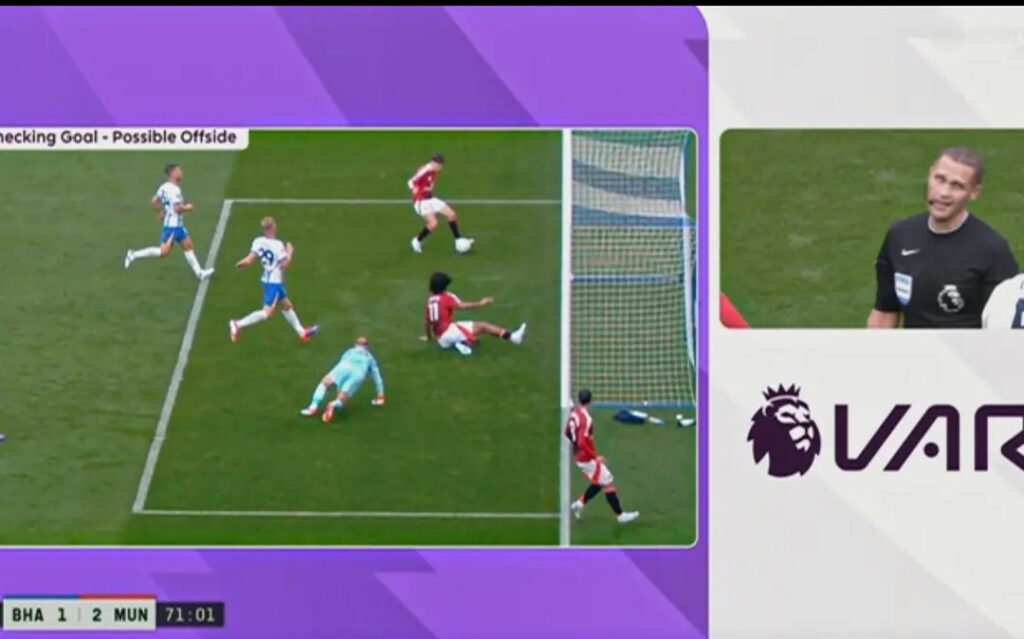In the 70th minute of a highly intense match between Manchester United and Brighton, the Video Assistant Referee (VAR) once again played a pivotal role, this time disallowing what appeared to be a legitimate goal by Alejandro Garnacho.
This incident added another layer of frustration for both the Manchester United players and the Old Trafford faithful, as they watched what they believed to be a crucial equalizer slip away due to a controversial VAR decision.
The disallowed goal has reignited debates about the consistency and reliability of VAR, especially in high-stakes matches where every decision is scrutinized.
Alejandro Garnacho, a young Argentine winger who has been one of Manchester United’s bright spots this season, seemed to have found the back of the net after a well-coordinated team move.
The goal was a moment of relief for United, who were pushing hard to overturn a deficit against a resilient Brighton side. However, the celebrations were abruptly cut short when the referee signaled for a VAR check.
The decision to review the goal introduced an immediate sense of anxiety among the United supporters, who have become all too familiar with the unpredictability of VAR decisions.
The review focused on an incident during the buildup to the goal, specifically a moment of contact between Garnacho and Brighton defender Joshua Zirkzee.
According to VAR, Garnacho made contact with Zirkzee in a manner that influenced the play, leading to the goal being disallowed.
The ruling was met with immediate outrage from Manchester United players, who surrounded the referee to express their disbelief, and from the fans inside Old Trafford, who voiced their displeasure with loud boos.
Replays of the incident showed what many perceived to be minimal contact between Garnacho and Zirkzee, which has led to widespread debate over whether the decision was justified.
The disallowed goal, which would have brought Manchester United level at a critical juncture in the match, was viewed by many as an overly harsh call.
Fans and pundits alike questioned the degree to which Garnacho’s contact influenced the outcome of the play, with some arguing that such fine margins should not be the basis for overturning a goal.
The controversy surrounding Garnacho’s disallowed goal was not the first instance in the match where VAR had intervened to Manchester United’s detriment.
Earlier in the game, a goal by Marcus Rashford was also ruled out for offside, a decision that had already left a bitter taste in the mouths of United supporters.
The cumulative effect of these VAR rulings only heightened the sense of injustice and frustration within the Manchester United camp.
After the match, the disallowed goals became the primary topic of conversation. Manchester United manager Erik ten Hag, while careful not to direct too much criticism toward the officials, expressed his disappointment with the decisions.
In his post-match interview, he remarked on the frustration of having goals disallowed, especially when the margins are so fine.
He acknowledged that while the decisions must be accepted, it is difficult to reconcile them, particularly in moments as crucial as these.
On the other hand, Brighton’s manager, Roberto De Zerbi, took a more measured approach. While acknowledging the role that VAR played in the match, he emphasized that his team’s focus remained on their own performance and how they could continue to improve.
De Zerbi’s comments highlighted the differing perspectives that teams often have regarding VAR, depending on whether decisions go in their favor or not.
The controversy surrounding Garnacho’s disallowed goal serves as a stark reminder of the significant impact that VAR can have on modern football.
While the technology was introduced with the intention of ensuring fairness and accuracy in officiating, its application continues to be a source of contention.
For Manchester United and their fans, the match against Brighton will be remembered less for the football played and more for the VAR decisions that went against them, leaving a lingering sense of frustration and injustice.


